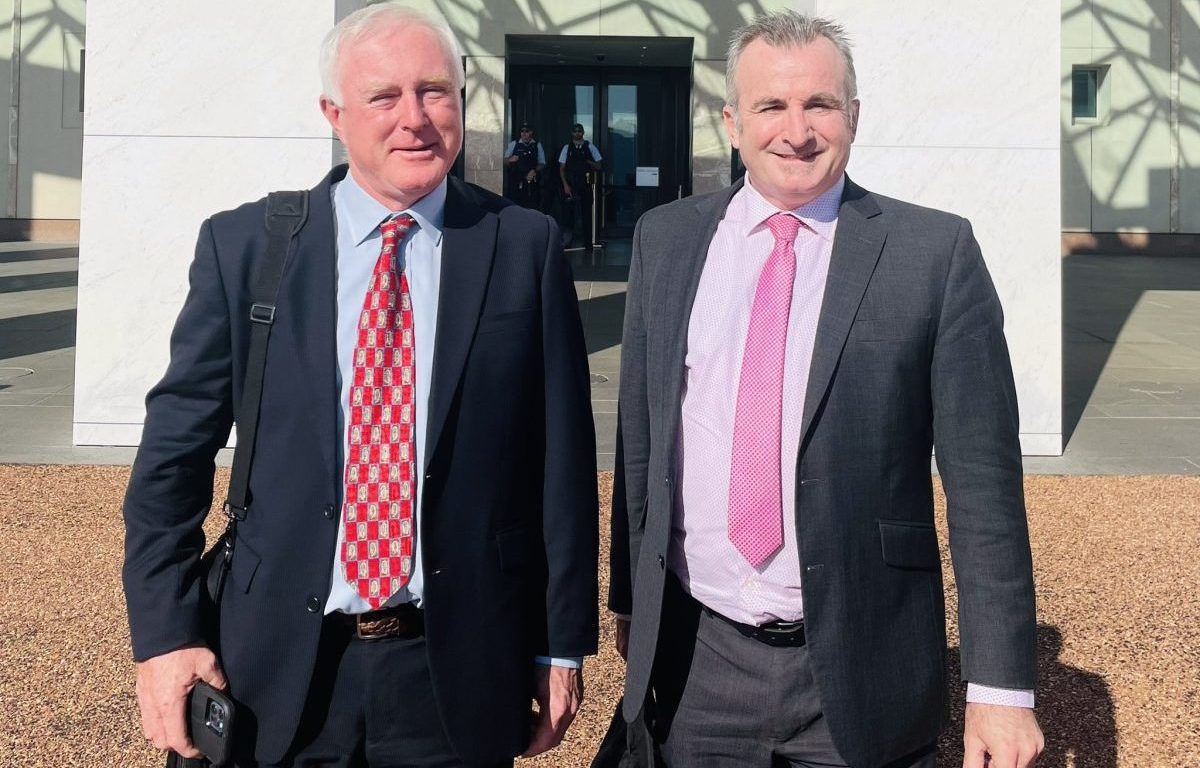
GPA’s Andrew Earle and Colin Bettles at Parliament House in Canberra.
GRAIN Producers Australia believes reducing input prices and increasing the efficiency of supply chains will strengthen and safeguard food security into the future.
GPA chief executive Colin Bettles and Mungindi grower and GPA deputy chair and northern region director Andrew Earle addressed the House Standing Committee on Agriculture’s Inquiry into food security in Australia on Friday.
Mr Bettles said while Australia produced a record crop last year, it was also the “most expensive crop we have ever planted”.
He said the rising price of inputs, such as fuel, fertiliser and chemicals, has been top of mind for growers, but was often forgotten by the public when they see increasing prices for baked goods.
“These inputs have also reached record levels,” Mr Bettles said.
“GPA’s post-harvest survey showed input prices are now a major challenge for our members.
“More than 80 percent of respondents said last year’s cropping production costs were significantly higher compared with previous years, while about 15pc said these costs were moderately higher.
Mr Bettles said one element to reduce these costs was for the government to promote and invest in the local manufacturing of fertilisers such as urea.
One committee member questioned whether the potentially higher cost of a locally manufactured product would be prohibitive for many growers, which many have access to cheaper overseas options.
While Mr Bettles and Mr Earle agreed most growers would choose the less-expensive product, they said local manufacturing was only one part of the solution.
“There is no silver bullet to the question of farm inputs.”
Mr Bettles said innovations like green fertilisers offered a “win-win” opportunity to continue high production and reduce emissions.
He said restricting access to chemicals, as has been seen via policies introduced in Europe and Canada, would not resolve input accessibility issues or positively impact the environment.
“[W]atching what is happening in other countries, the concern is that there’s got to be a scientific approach and a very pragmatic approach to the accessibility of those inputs.
More GM crops
Another possible avenue to possibly reduce fertiliser and chemical usage could be to investigate more genetically modified crops.
Mr Bettles said the possibility of more GM crops than the already accepted canola line was a “big opportunity” for the Australian grains industry.
“It has sustainability benefits as well and some of those varieties, shorter season varieties for example, help farmers adapt and get more out of their paddocks.
“We were held back here with GM canola, but I think there has certainly been some developments recently with GM wheat varieties approved in Brazil and Argentina which creates some optimism.
“It is a policy space where the science has demonstrated that it has mutual benefits.”
Value gain from supply chains
Mr Bettles said the past three large crops have created challenges for supply chains across the country, all of which were also impacted by COVID-19 lockdowns and labour issues.
Committee member and Member for O’Connor Rick Wilson said he had seen this issues firsthand in his home state, Western Australia.
“With the last two seasons of record crops, we’ve seen 24.5Mt and this year 26Mt,” Mr Wilson said.
“The logistics and supply chain are under extreme stress which has led to the predicted carryover from last year’s crop; (it) was going to be 5Mt – because it was a wet, cool and late start to harvest, that ended up being 3.5Mt.”
He said delays getting grain to port and to international customers had meant WA grain prices were flat creating “several billion dollars in lost value”.
Mr Bettles said GPA was aware of these issues seen in recent years.
“I think what the last three years in particular have shown is that there is a value capture opportunity that we are missing out on.
“When our crop comes online before the Northern Hemisphere crop, that first six-month window of opportunity to sell into Asia in particular…is a value capture opportunity of $2-$5B; we don’t know the exact number.”
He said record crops were not considered average production, and the variability of crop size due to droughts or wet seasons made it difficult for companies and government to invest in infrastructure.
“It is a challenge for the people on the logistics side of things and the bulk handlers as well because the crops go up and down.
“If you knew you were going to get 60Mt or 80Mt every year then it would be a purely academic investment decision.
“We would walk into the transport minister’s office with a longer-term package of investment where regional economies and the national economy would benefit as well.
“Ramping up those supply chains when you lose labour in particular, and not having that high volume of grain to get the confidence to invest in the supply chain is problematic.”
Mr Bettles said that was why a multi-pronged approach was needed to increase crop production through innovation, green and locally produced fertilisers and possibly GM crops to ensure the supply chain has certainty to undertake projects to reduce bottlenecks during harvest.

Australia’s GM canola, cotton and safflower make us the 13th of just 29 countries growing some GM crops. Only 0.08% of the Australian continent and 2.1% of our croplands grew GM varieties in 2019. In contrast, GM-free certified organic farms now cover 35.645 m ha – 8.8% of Australia’s farmland – four times the area of GM crops.
GM wheat is not welcome here for farming or food. FSANZ approved imported GM wheat (A1232) last year, despite the objections of major flour and milling companies – Champion Flour Milling (NZ); Allied Pinnacle; and Mauri, the bakery division of George Weston Foods that owns Tip Top Bakeries and employs over 6,000 people. They know shoppers will reject GM wheat flour. Smart farmers will do the same, to protect wheat export markets.